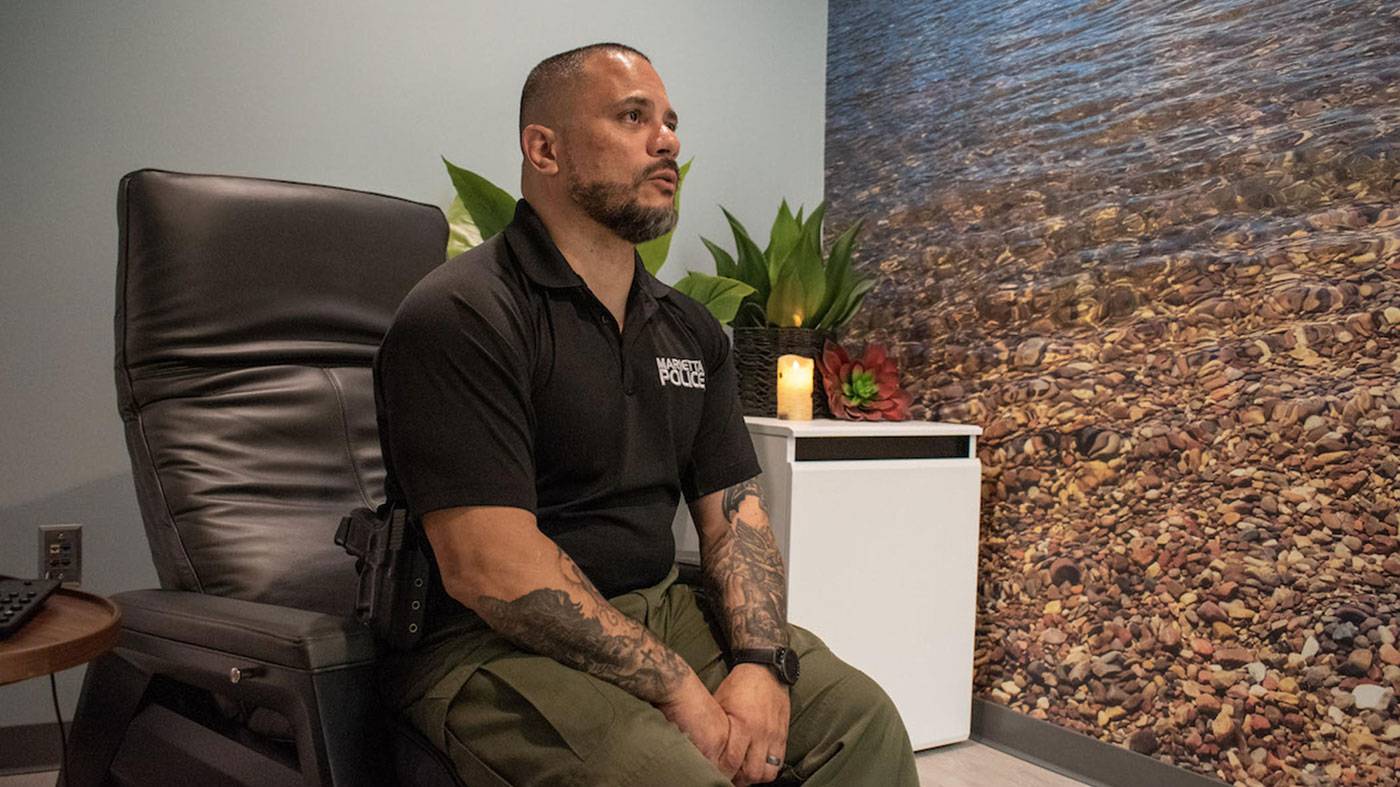Original Story by Katja Ridderbusch, GPB News
Posted: May 16, 2023 10:20 AM
Sgt. Ray Figueroa shuts the door, dims the light, and sinks into a black massage chair. He’s had a particularly stressful day.
The rushing sound of a mountain river flows from the speakers inside this small room at the Marietta Police Department.
“I had to come in here for 15 minutes because I needed some quiet,” he said.
Figueroa, originally from New Jersey, has been with the Marietta Police for 22 years. A former SWAT team member, he is now assigned to the training unit. Initially, he was skeptical about the new wellness room — called “Zen den” by some officers — that opened a few weeks ago.
He said law enforcement is an environment packed “with alpha males and alpha females.” He never thought the idea of getting them to come into a room, listen to some soft music and relax would work — until he tried it himself.
“And I said, ‘Well, it’s actually pretty nice.’”
With 140 officers and headquartered just north of Atlanta, Marietta PD is the first in Georgia, and one of a few in the country, with a dedicated wellness room. The space is outfitted with a massage chair, dimmable lights, aromatherapy oils and a sound immersion system.
Here, cops can decompress after a particularly stressful event, like a fatal car wreck or a shooting. They can also relax during or after a regular shift that may spiral from mundane into violent within split seconds.
“I expect these young men and women to go out and handle very dynamic and complex human situations,” Chief Marty Ferrell said. “And I’ve got to give them something to help them cope with the things that they see on a day-to-day basis.”
But it’s not just about the officers. The community benefits as well, Ferrell said — especially in a time when cases of misconduct and violence make frequent headlines.
“Because how can we take care of you, our citizens, if we’re not taking care of ourselves?” he said.
Relentless job pressure leaves a mark on cops’ physical and mental health. Many struggle with burnout, and the rate of post-traumatic stress disorder is five times as high in police officers as in the civilian population. Some studies estimate that 30% of cops have a substance abuse problem.
In 2022, 160 law enforcement officers died by suicide, more than the number killed in the line of duty, according to First H.E.L.P., a mental health advocacy for first responders. Marietta police lost two officers to suicides in the past few years. The deaths shook the department, prompting Ferrell to prioritize mental health when he became chief last October.
The concept of wellness rooms caught on during the COVID-19 pandemic. Just like front-line health care workers, police officers experience constant and extreme adrenaline spikes, said Dr. Jody Hughes, chief medical officer and a critical care physician at Wellstar Cobb Hospital.
Repeated episodes can lead to chronic high blood pressure and elevated heart rates, which may eventually cause heart disease, he said.
“Also, the stressors of these environments can put people at risk for depression, anxiety, and problems with sleep,” he said.
Science has found that stress and aggressive behavior reinforce each other. Hughes said relaxation tools such as low-frequency beats, soft lights and aromatherapy could help cops lower their stress levels.
“They’re not on edge as much, and it can promote a more calming state for their bodies,” Hughes said.
In Marietta, officer Jonnie Moeller-Reed is all in. “Once I heard it was a go, I was thrilled,” she said.
But not everyone in the department is convinced. Moeller-Reed, who started Marietta’s peer-support program several years ago, said younger officers and those more comfortable with the idea of self-care find it easier to embrace the concept. But to the hardened and sometimes cynical veteran cops, the wellness room is a tough sell.
“Some officers think this is a place for me to go and basically curl up in the fetal position, waive my surrender flag and say, ‘I can’t take it anymore,’” she said.
But that is not how it works, she added. The room provides a safe area where officers can go and “physically come down from all of the chemical dumps that go on inside your body under stress.”
It can also make the transition from work to home easier, she said.
Of course, the wellness room is not a cure-all, but it’s a way to improve the physical and mental well-being of officers and can affect how they police their community, said Ferrell.
He said he wants the men and women in his department to know “that we are looking out for their best interest, so they are at the best they can be when they come to your house. When you’re in distress.”
The wellness room also ties into Marietta’s jiu-jitsu program. The department was one of the first in the country to make the martial art mandatory for its officers. Early data suggests that jiu-jitsu helps improve physical and mental health and may prompt officers to use less force during an arrest.
Sergeant Figueroa thinks that eventually, just like the jiu-jitsu program, the wellness room will catch on with officers in Marietta and beyond. It may even become a cool tool for cops to use.
“In law enforcement, we hate change,” he said with a smile. “Until we try the change out. And then we go, “Wow, what a great idea.’”

 KevinCare
KevinCare Historic $50M Gift
Historic $50M Gift 
